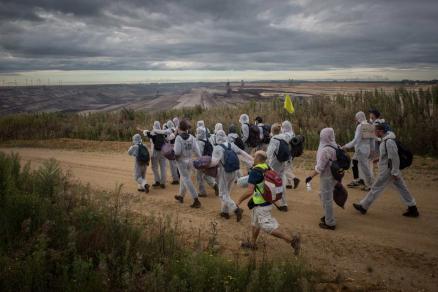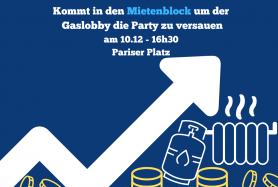Ende Gelände is a huge success for the climate movement. The Interventionist Left (IL) was part of it and we want to provisionally take stock of the campaign. We are looking forward to your feedback and hope in the future we will join forces in struggles against coal, climate change and capitalism.
On the 15. August we set out from the climate camp in the Rhineland village of Lüzerath with over 1000 peoplet to send a clear message against the destructive coal industry. We crossed a national highway and numerous police lines, descended into the apocalyptic coal mine Garzweiler and blocked conveyer belts and a few gigantic coal excavators. Determinedly and with plenty of phantasy the climate activists surmounted all barriers along the way. We would like to thank many people, such as the climbers who abseiled and stopped the traffic, making the crossing of the highway possible for hundreds of people. We also want to mention the green finger that was capable of passing a four rowed police line thereby making it into the pit as the first batch. It is beyond the scope of this article to list all successful activities. We would like to thank all fingers. Everyone consequently adhered to the action agreement and the spirt in the fingers was marked by strong solidarity amongst all involved. This context allowed many who had never participated in direct action before to experience a from of empowerment. Almost all activists got into the mine and to we meet the target of stopping operations in Garzweiler for almost the entire day.
The action was successful despite massive and at times surprising police violence. In many cases police drastically attacked activists with batons and pepper spray. The took over 300 people into custody way into the night and blatantly violated rights of many journalists. Especially the operation of RWE internal private security personnel is a new level of the cooperation by repressive state agencies and private corporations. RWE's thug gangs comprised almost 1000 securities and workers who directly collaborated with with the police in kettling people, removing prisoners and attacking activists. Self-critically we also have to admit that we possibly did not sufficiently prepare all participants for the assaults by the police and security forces. But this even elates us even more as people unflinchingly continued to walk on, ignoring police provocations, sticking to the action's overall aim. Especially reassuring is the fact that hundreds of those blockading deliberately refused to provide their IDs, leaving the police with no other option than setting them free. This tactic should be carefully evaluated for future actions.
We are convinced the breadth of the colation proved to be successful despite the latent potential for tention. Ende Gelände includes anarchist shaped climate activists around the group of Ausgeco2hlt, which for years organises climate camps and protest in the area; it includes growth critics who became politicised through the degrowth conferences and concrete alternative projects; it also includes post-autonomists who brought their experience of massive civil disobedience to the colation; and finally representatives of NGOs, who hoped to gain strength and support for their anti coal campaigns. The solidarity declaration of well known development and environmental organisations issued merely a few weeks ahead of the action helped publically spread our message. Simultaneously the continued occupation of the excavators by people from the Hambacher Forst before and after the action was really encouraging. We were especially excited about the 300 international activists from Europe and beyond who joined us in our discussions, the action and the celebrations. We think this expresses the transnational dimension of the climate movement. Different political backgrounds, political understandings, cultures and and forms of organising posed a real challenge to the colation in the weeks leading up and immediately before the action. Through communal living at the camp and the discussions, shared experiences and and impressive solidarity during the action, participants, groups and spectrums could put their differences aside and grow to awards a organic climate movement. Together they made sure this action was a success!
From the beginning intensive press and media work was part of the Ende Gelände campaign: But for a long time the press team had to fight hard for any attention. Only with the onset of the camp journalists started to show any interest in us. But with the action public focuses shifted and for a few days we and our struggle received considerable media attention. Many representatives of the printing press, TV channels and alternative media projects visited our camp and reported on our aims. But a real ace was taking journalists along to the action and into the mine. Consequently media reported quite positively about Ende Gelände, at times openly criticising the repression and surprisingly were responsive to our messages.
Not only the media, but the action itself focused on our demand for an immediate end to coal. This emphasis was right, as only this made it possible to unite so many activists for one aim and permeate mainstream media. Yet our link between social and environmental questions, but also the the general critique of a destructive growth paradigm within capitalism remained a sideline issue in the media. But these links had their place during the camp and the action. Especially during the numerous workshops and panel discussions at the Summer School “Degrowth concrete” that took place parallel to the camp, debates around the link between climate change and migration, as well as capitalist production and global warming. In the mine on our banners we showed solidarity with the struggles against gold mining in Greek Chalkidiki and we invited RWE miners for a discussion about a just transition. We view it as a central task to leave the simple equation of climate movement=anti coal struggle behind and focus more strongly on linking different struggles. In order to fight against a mere green form of capitalism with its need for expansion and to develop a global solidarity perspective some anti-capitalist forces are needed.
The action was a decisive moment for the climate movement. If the action is supposed to strengthen climate activists' struggles Ende Gelände should not remain a flash in the pan. In order for events like the one in Garzweiler to have a catalyst effect, such events have to express real and local energy struggles. And we did have those in the past few years: in Tübingen, Bremen , Hamburg and Berlin initiatives fight or fought for free public transport. In Berlin and in other places a broad colation worked towards the democratisation of municipal energy supply via a referendum. In Hamburg the fight against the stone coal at Moorburg continues and in Lusatia and the Rhineland the climate camps help to continue protest against lignite coal. Especially the activities in and around Hambacher Forst do give RWE a hard time. Particularly the action directly following Ende Gelände was a success: excavators were occupied and the conveyer belt blocked.
Ende Gelände is a success. It helps to bolster these struggles and multiplies them. The campaign in the Rhineland has to be continued. But the struggle for climate justice has to be brought to different localities to win people over for the project of a radical socio-ecological transformation. We have to organise to win the fight against fossil fuel industries. And we have to do that in our cities, in our affinity groups and at a national level. An important step would be the action conference of Ende Gelände from the 7. to 8. of November 2015 in Leipzig.
That was only the beginning. We shall see each other again – no matter if it is in the Rhineland or in your city.
End coal now – energy for all – socialise energy supply – overcome capitalism!


